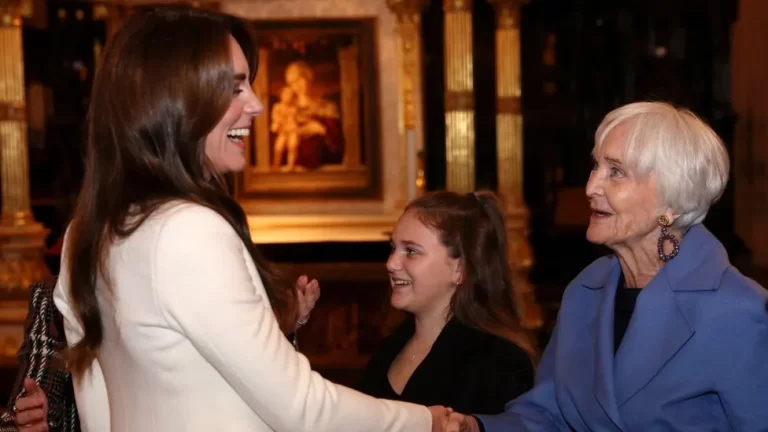Dame Sheila Hancock has said she has the ultimate privilege to speak her mind without fear of being “cancelled”, having reached the age of 90.
“If I say something outrageous and I'm cancelled, I'm shortly going to be cancelled by death anyway,” she tells the BBC's Amol Rajan.
“It gives me a sort of ‘oh dear I don't care, because I'm going'”. Dame Sheila, who earned her title in 2021 for services to drama and charity, is one of Britain's most respected actors, singers and writers.
In her career spanning more than seven decades, she has appeared in Entertaining Mr Sloane, for which she won a Tony, and popular shows such as Annie, Sweeney Todd and Cabaret. Her film and television highlights include Carry On Cleo, The Boy in the Striped Pyjamas and Edie.
Starting her career on a prestigious scholarship at the Royal Academy of Dramatic Art (Rada) she says she “was one of the very few working-class people” there. She says she “spent the whole time” she was there being told that the way she pronounced certain words was wrong and was chastised for this by the other people on her course.
“All the other people in the class were frightfully posh and they were all shrieking with laughter,” Dame Sheila recalled.
‘I passed out'
After graduating from Rada, Hancock started working in theatres immediately to earn money. She says workers “were on very low salaries” and regular visitors to the theatre began to see how much she was struggling with the lack of pay as she looked visibly malnourished.
“The locals used to come round with hotpots for me because I was incredibly skinny and eventually I passed out because I got malnutrition,” Dame Sheila recalled. When she wasn't battling with a poor diet, Dame Sheila was trying desperately to break into the acting world.

Letters found in the BBC archive show that she wrote to the corporation at the age of 19, saying she was a “struggling actress who knows no one with an influence”. A year later she was given a general audition, but again faced more setbacks in the feedback they gave her.
“I got an A for acting, but the comment was ‘could be useful in juvenile character', which is cleaners and maids.” Her first big role in comedy drama The Rag Trade did allow her to draw on her working-class experience, taking on Carol – one of the women in a sewing factory – in the early 1960s.
It came nine years after working in regional theatre and wasn't the character originally intended for Dame Sheila – she was given another role and wrote to the head of comedy at the BBC at the time asking to play Carol.
The show was a big hit, bringing in 11 million viewers.
“I'm quite glad to talk about it because whenever there's a history of the theatre in progress and for women, particularly the Rag Trade is never mentioned, because it was a cheap old comedy show.
“It actually was a huge breakthrough – three women in the lead [roles], we had the best parts and each week we got the better of the men,” she said. This proved to be a huge breakthrough for Hancock, leading her to front her own shows and appearing in classic films such as Carry on Cleo in 1964.
Plastic surgery suggestion
As an actor and a performer who established herself in the 1950s, she struggled throughout the early parts of her career as someone who didn't fit in with the strict beauty standards of the day.
“I had acne, so I had a bad skin. Somebody saw me in Bromley Rep doing a performance as a model and they asked me to go and see them in the office.
“He sat me under a lamp and said, ‘Well, you'll have to have plastic surgery because my nose is so odd, you know?'
“So I didn't fit the pattern of what is best to look like as a woman, really, in those days,” she said.
Dame Sheila said she was also in a successful play called Rattle of a Simple Man, in London's West End, but a “more beautiful version” – another actress – was chosen for film adaptation. She says it wasn't until years later that a producer on the film came to apologise to Hancock for not using her in the film.
Outside of her career, Dame Sheila speaks about the grief she has suffered, saying she is “not good at passing on lessons” as “I don't learn lessons myself”. She has lost both of her husbands – Alec Ross in 1971 and John Thaw in 2002, and says the only thing she can say is that you “eventually come out the other side”.
Dame Sheila has found a coping mechanism though – the Quaker faith, which she began practising in the 1980s after a battle with cancer.
“When I got cancer, I knew there was something missing in my life. There was a level of spirituality, it was lacking,” she recalled.

“[With the] Quakers I was immediately at home. [There was] this marvellous thing of worshipping in silence. But it's not meditation. It's not going in on yourself, it's going out, it's reaching out for something,” Hancock said.
And whether it's helped her with grief?
“Oh God, yes,” she says.
— CutC by bbc.com


